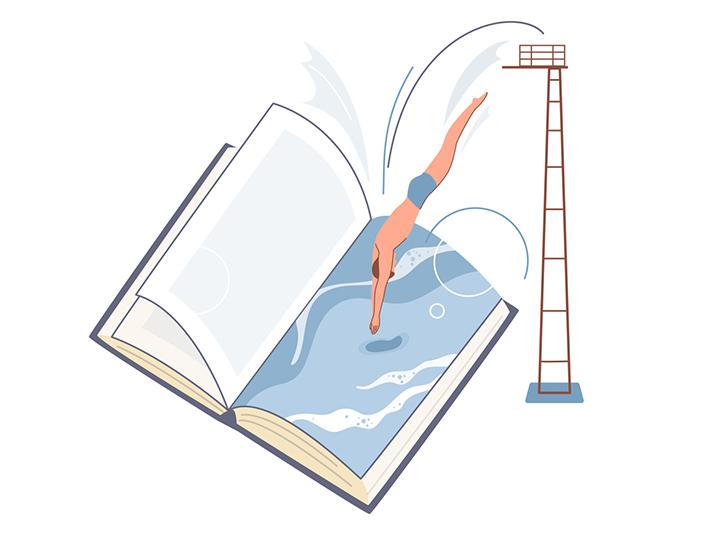
How to figure out your book

You may also like
For academic book writers, summer is an endless languid sea. At long last you have a student-free expanse of time to deep dive into your biggest ideas and swim around inside the feedback, fragments, notes and nearly done chapters.
But unless you know where your book is going, you might end up paddling in circles, treading water or dipping a toe around the edges of a manuscript that needs restructuring. Sometimes writers are afraid to take time to listen to the nagging feeling that your book’s better self is hiding somewhere under the surface.
But those who do will tune into their sense of purpose. And they will experience greater ease and calmer focus as they craft a book that truly engages readers.
- Spotlight guide: take your academic writing skills to the next level
- Keeping your research relevant in an accelerating news cycle
- How to promote your book with confidence
Here are a few ways to help you do that this summer. Then, come autumn, you’ll make progress more easily in the shorter moments between classes and committee meetings.
Why do you care about writing your book?
In what we call “idea therapy”, we ask writers about what they care about and what’s troubling them. This is time for “what if” thinking, play and a bit of experimentation. So, give yourself space to explore. You might uncover insights and connections you didn’t know were buried under uncertainty and self-doubt.
Start by asking yourself:
- Why did I originally pursue this work? What drew me to it?
- What excites me about this book now?
- What am I afraid of or worried about when it comes to writing this book?
We avoid the hackneyed “So what?” question whose aggressive stance can induce writerly fight, flight or freeze. Instead, try to ease into generative queries that encourage nuanced ways of thinking. Asking “What do I want to talk about with my reader?” helps you reframe your manuscript as a conversation with someone you care about rather than as a presentation or proof. “What do I want the reader to get out of it?” shifts your attention away from yourself to linger on what the reader might enjoy.
It doesn’t matter whether you’re embarking on a second, third or subsequent book from just a seed of an idea or if you’re transforming a good dissertation into a far superior book. This work is all about figuring out what’s driving your book forward before deciding what goes in it and what gets tossed – or saved for a future talk or paper.
Find your story and tell it
Story is central to most writing, as Erin O’Dwyer noted on Campus, and yet so few academic writers think about it. For some, storytelling might not be on their radar. Others actively resist it as something reserved for fiction or trade books. But every good academic book tells a story. And taking time to find yours will make the rest of the process so much easier. When the conversation shifts from “What’s my argument?” to “What’s my story?”, the writer loosens up, focuses and finds their point.
When you’re ready, experiment with finishing this sentence: “This book is a story about…” It’s probably going to be difficult at first, and it’s going to take at least a few tries. Be patient. Try adding a “how” after the “about” and see if that helps.
Find the ‘how’ and ‘why’ in your academic book
Sometimes writers explicate themes rather than wrestle with questions. To ensure your chapters do the latter, try to write your chapter titles as statements that start with “how” or “why”.
These two words force you to turn an academic abstraction such as “immigration and urban change” into a specific claim in which you clearly and succinctly say what is at stake, like “How Latin America built LA”. Because academic abstractions are often built on a foundation of weak nouns, starting with “how” or “why” will automatically push you to put the power of your ideas into simpler, more concrete verbs. It will also encourage you to tell a story about change or take on the complexities of causes instead of assembling examples to merely describe a phenomenon.
Your chapter titles will likely change before submission. This is just an exercise to help you move from stating a topic to developing an argument that helps both you and the reader better understand what matters.
When you scroll through the day’s headlines, notice how outlets, including Campus, use “how” or “why” headlines (as in our piece) to pique interest and make readers want to find out more. That’s the desire you want to ignite.
Learn to like your book
You can do all these things, yet sometimes self-doubt remains. That’s why we do one final exercise that helps you like your book even in its imperfect state. When you like it, you’ll nurture it to become even better than you thought possible.
Imagine you’re in line for coffee between conference sessions, and you overhear a conversation behind you.
Person 1: Read anything good lately?
Person 2: Yes, I thought [insert your book title] was great.
Person 1: Oh, yeah, I heard about that. What did you like about it?
Now, what do you want Person 2 to say?
Don’t worry if imagining this makes you uncomfortable. Almost everyone we give this exercise to feels similarly. But when you articulate what you want your reader to like about your book, you will see how you need to change it. That makes it a lot easier to climb out of bed each morning and get to work restructuring, revising and crafting a book that so many others will like, too.
K. Anne Amienne is founder and director, and Daniela Blei is lead editor, coach and public scholar mentor, both at Scholars & Writers, a consultancy that provides coaching, editing and public scholar support for European and North American academics.
If you would like advice and insight from academics and university staff delivered direct to your inbox each week, sign up for the Campus newsletter.


